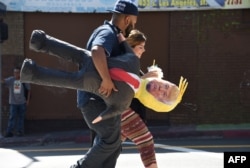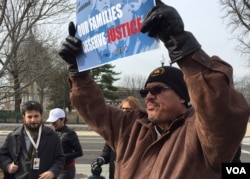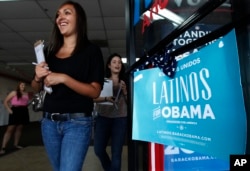With voters about to start weighing in on the 2016 presidential race, Democratic pollsters say they are confident with whichever of their candidates runs in November’s general election.
They point to demographic statistics showing that American society is becoming more ethnically and racially diverse, more secular, more unmarried and more urban. These trends come at a time when polls show the Republican Party increasingly appeals to rural, white, married, religious voters.
But Republican pollsters say they also feel confident about whomever emerges as their nominee.
They say a Republican candidate will be better able to tap into deep-seated anger and frustration across the country and a powerful desire for change. Members of both major political parties have reasons to hope — and reasons to worry.
Hispanics favor Democrats
One thing is indisputable: Hispanic voters, and how they turn out to the polls in November, will have a major impact on the outcome of the 2016 presidential election.
Latinos now make up 11.9 percent of eligible U.S. voters, almost equal to the percentage of black voters, and both groups heavily favor Democrats.
Hispanics are the largest minority group in the United States, comprising 17 percent of the total population, and that number is projected to grow.
Every year, some 800,000 Latino youths turn 18 in the United States and are eligible to vote.
In 2012, 75 percent of Hispanics voted to re-elect Democratic President Barack Obama, while only 23 percent voted for his Republican opponent, Mitt Romney.
In 2016, the numbers could be even worse for Republicans.
None of the Republican presidential candidates is advocating for comprehensive immigration reform legislation with a pathway to citizenship.
But Republican frontrunner Donald Trump has made illegal immigration the centerpiece of his campaign, vowing he would build a massive wall along the southern U.S. border and make Mexico pay for it. He says if he is elected, he would have the estimated 11 million undocumented immigrants in the United States rounded up and deported.
These and other comments have been strongly condemned by immigrants' rights groups, and all three Democratic presidential candidates — former Secretary of State Hillary Clinton, Senator Bernie Sanders and former Maryland Governor Martin O'Malley.
All of the Democrats support immigration reform legislation that includes a pathway to citizenship, and they support executive action by Obama to give the undocumented parents of underage American citizens legal status and work permits.
Republicans strongly oppose the president's executive actions on immigration, and the Supreme Court will weigh in on the issue in June.
‘A shattering election’
Democratic pollster Stanley Greenberg wrote a book called Ascendant America, in which he outlines what he calls "revolutionary" demographic, technological and cultural shifts.
He says most American millennials see immigration as a positive force, and also accept gay marriage and a woman's right to choose an abortion, issues that favor Democrats.
Greenberg told VOA he believes the Republican Party is in for a very rough election in November.
"I've said this will be a shattering election, because I think it will be very disruptive; the trends in the country just will be inescapable,” he said. “You can't be an anti-immigration party in America. You can in Europe, you have proportional representation, you have anti-immigration parties or some center-right parties that have taken up these issues.
"But in the United states, when you have a two-party system and you're just not going to get elected," he said. "You can't have one party be an anti-immigration party in so diverse a country."
Greenberg says he believes that if Republicans lose their third presidential election in a row, some new Republican leaders will emerge who embrace diversity, immigration, and what he terms "the modern American family," as opposed to a more traditional concept of family.
But Greenberg and other Democratic consultants concede that although Hispanic millennials are the fastest-growing new group of voters, they are also the least politically engaged. The Pew Research Center says only 48 percent of Latinos turned out to vote in 2012.
Whoever becomes the Democratic nominee would need a massive grass-roots operation to motivate Latinos to register and go to the polls.
‘Deep-seated’ anger
On the Republican side, pollsters and consultants say they are concerned about Hispanic voters, though they say the impact may not be as strongly felt because of that group's low turnout.
Republican pollster David Merritt told VOA that he does not believe that Republican frontrunners Donald Trump and Senator Ted Cruz are hurting the party with their comments about immigration.
"I mean they have tapped into an anger that really actually expands beyond the Republican Party,” Merritt said. “In all of our research going back the last 18 months to the midterm elections of 2014, the level of frustration, the level of rage, the level of anger out there among the American people is incredibly deep-seated.
“And as I said, it is mostly on the Republican side, but there is a frustration on the Democratic side that you can see reflected in Bernie Sanders' success. And certainly Independents feel that frustration with Washington."
The mood of frustration with Washington will give a significant advantage to whomever is the Republican nominee, Merritt said, because the American people are demanding change and rejecting the status quo.
So demographic changes, voter turnout and deep-seated anger among many voters will likely make for a suspenseful election night Nov. 8, 2016.







